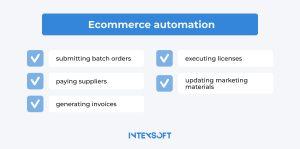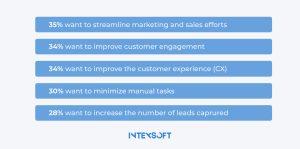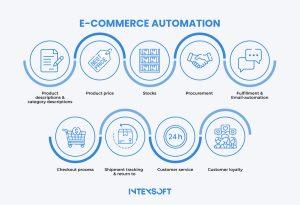What Does E-Commerce Automation Entail, and How Can You Implement Automation Within Your Online Business?

This post encompasses all the insights about automation in ecommerce necessary to optimize your processes, elevate customer satisfaction, and propel your sales to new heights. Uncover the intricacies of ecommerce automation and learn how to integrate it seamlessly into your online business. If you need further assistance, contact us for a free consultation.
Reading time: 15 min.
Automation is a game-changer for boosting productivity for any ecommerce store. Instead of spending endless time and energy on incremental tweaks, businesses can opt for transformative solutions that overhaul their operations. By instantly automating thousands of repetitive tasks, companies can free up working hours once tied up in mundane activities.
The impact of ecommerce automation software is evident in Shopify‘s impressive stats. By implementing new solutions, businesses have eliminated a whopping 1.1 billion manual workflows, saving more than 9 million hours.
Dive deep into this IntexSoft article to gain comprehensive insights into the automation in ecommerce. With this knowledge, you’ll be able to assess your business’s automation needs carefully and map out a strategic implementation plan.
When it comes to ecommerce automation, you should understand that it integrates customized software tools designed to refine and enhance various operational procedures within an online retail venture. Simply put, it involves technologies proficient in optimizing order fulfillment, client communication, and inventory management processes. While these tasks remain core, automation extends its scope beyond these realms.
The underlying principle guiding these tools is their capacity to transform repetitive manual tasks into streamlined and automated workflows.

Ecommerce automation is like having a super-smart assistant for your online store. It uses analysis, triggers, decision-making, action, and optimization to make your business smoother, boost productivity, and give customers a top-notch experience.
Here’s a breakdown:

Automation is a crucial aspect for online store owners to consider for business success. It simplifies tasks, improves customer satisfaction, and fuels growth. Automation makes businesses run smoother, make fewer mistakes, and adapt more effectively to market changes. Additionally, it provides valuable, well-analyzed data for better decision-making.
The table below provides detailed information on all the aspects mentioned above.
| Key points | Importance in ecommerce |
| Customer satisfaction | Each automated ecommerce store ensures an enhanced shopping experience, fostering greater customer satisfaction and bolstering loyalty among shoppers. |
| Analytics capabilities | Automation transforms how we analyze ecommerce data by swiftly handling large volumes of information, offering in-depth insights, and aiding more intelligent decision-making. |
| Time-saving | Automated processes cut down on manual tasks, saving time for employees and customers. |
| Targeted abandoned cart recovery | Ecommerce automation companies save abandoned carts and turn missed chances into money-making sales. With targeted messages and timely reminders, they boost customer engagement and help your business thrive. |
| Marketing effectiveness | Automating your marketing efforts can boost your sales and maximize returns on investment. It streamlines the process, targets the right audience, and ultimately leads to more sales and profits for your business. |
| Productivity | Automating everyday tasks turbocharges productivity, allowing your team the flexibility to focus on high-level goals and strategic initiatives. |
| Scalability | Automated online business effortlessly adjusts to evolving requirements, ensuring a smooth expansion. With automation, you can seamlessly manage rising order volumes and customer inquiries without overwhelming manual efforts. This adaptability allows for flexible growth. |
| Inventory management | Automation fine-tunes inventory management, curbing both stock shortages and excess inventory scenarios. By precisely tracking product levels and forecasting demand, special systems ensure optimal stock levels, reducing the likelihood of missed sales opportunities or unnecessary storage costs. |
| Cost reduction | Automation slashes operational costs by minimizing errors and optimizing resource usage. Through streamlined processes and efficient workflows, businesses can achieve significant cost savings while maintaining high levels of productivity and efficiency. |
| Streamlined operational workflows | Automated workflows simplify tasks, making operations smoother and more efficient. Businesses can boost productivity and achieve better results by automating repetitive actions and standardizing processes. |
| Business intelligence | Automation ecommerce everyday tasks turbocharge productivity, giving your team the freedom to concentrate on big-picture projects and strategic endeavors. |
| Reduced human error | Automation in ecommerce slashes the likelihood of errors from manual tasks, boosting accuracy and reliability to new levels. |

One of the most effective tools at your disposal? Ecommerce automation. Let’s explore how automation can revolutionize your online store and become a vital component of your business growth strategy.
In today’s competitive landscape, ensuring customer satisfaction is paramount. Ecommerce automation plays a crucial role by streamlining order processing, providing timely updates, and offering personalized communication. These efforts contribute to elevated levels of customer satisfaction. According to a study conducted by Bain & Company, businesses that prioritize customer experience witness revenue boosts of up to 8%.
Manual processes are prone to human error, which can result in costly mistakes and dissatisfied customers. Ecommerce automation minimizes errors by automating repetitive tasks such as inventory management, order processing, and data entry. This not only improves accuracy but also frees up your team to focus on value-added activities.
With automation tools, you can implement targeted marketing campaigns, track customer behavior, and personalize interactions, all of which are proven strategies for driving sales. According to Adobe, personalized promotional emails generate six times higher transaction rates than generic ones, highlighting the importance of tailored marketing efforts.
Empowering your employees with automation tools allows them to work smarter, not harder. By automating routine tasks, your team can dedicate more time to innovation, strategy development, and customer engagement. This not only boosts morale but also fosters a culture of continuous improvement within your organization.
The realm of automation tools for online stores is vast, offering a plethora of options to choose from. To pinpoint the perfect solution for your business, it’s essential to have a deep understanding of its unique requirements and match them with the specific features of each tool available.
After thorough analyses, we’ve pinpointed the leading solutions in nine areas:
Take a glance at the table provided below to identify the tools that best align with your business needs.
| Primary parameters | Leading tools |
| Marketing automation |
|
| Sales & CRM |
|
| Inventory management |
|
| Order & shipping management |
|
| Multi-channel management |
|
| Accounting & finance |
|
| Customer service |
|
| Ecommerce platform automation |
|
| Workflow automation |
|
Don’t let your online store fall behind – invest in ecommerce automation today and unlock its full potential for business growth and success.
Ecommerce automation software can revolutionize your business operations, offering an engaging and efficient means of interaction with both employees and customers. Where to start?
If you’re seeking to optimize your operations and looking for an innovative, cost-effective solution, outsourcing ecommerce automation could be the answer, enabling you to stay relevant in the industry.
Choosing the right tech partner is key to success. A trusted outsourcing company can help you find an affordable solution and deliver a fully automated online store on schedule. This allows you to delegate tasks to ecommerce developers seamlessly, ensuring you reach your goals and come out ahead of direct competitors.
Feel free to contact IntexSoft whenever you’re ready for a complimentary consultation tailored just for your ecommerce business needs!